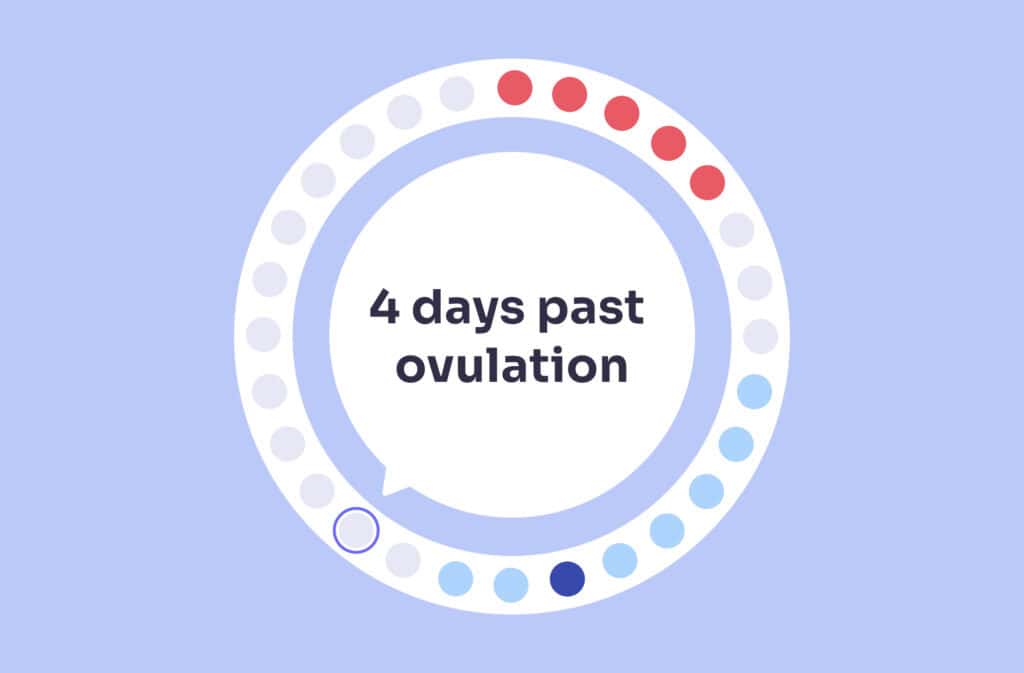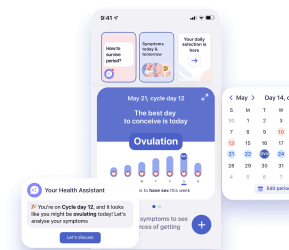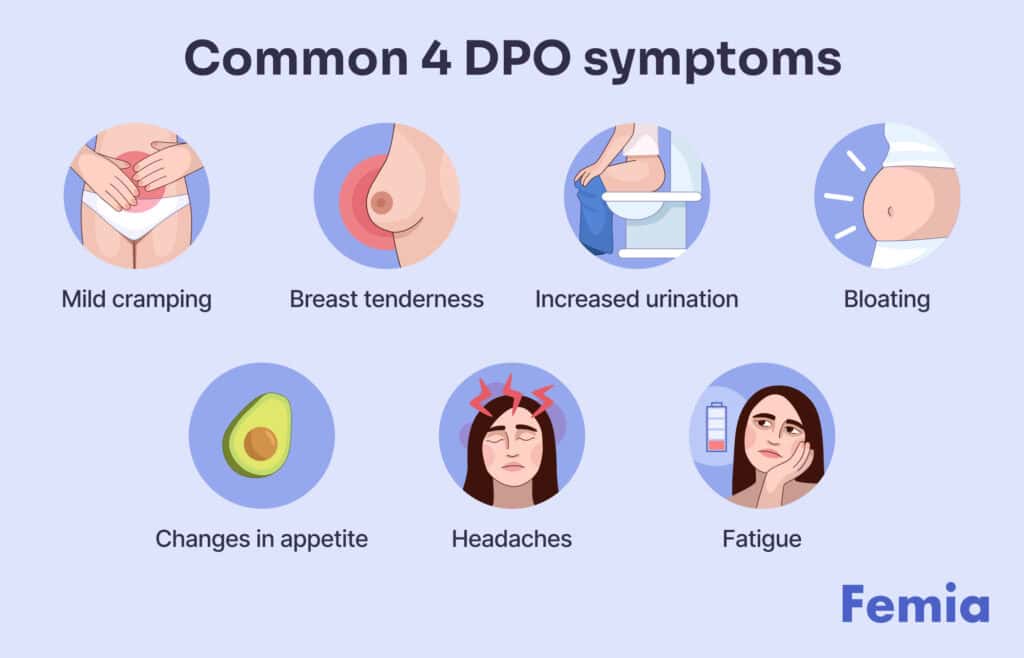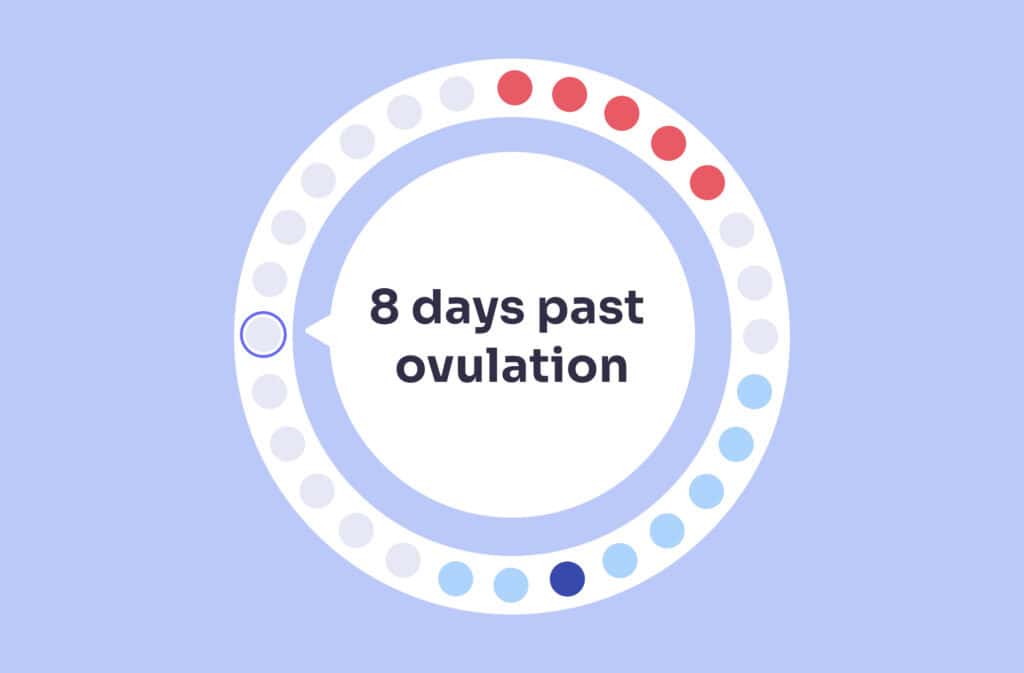Femia > Health Library > Getting Pregnant > Trying to conceive > 4 DPO: What to expect, and how to tell if you’re pregnant
4 DPO: What to expect, and how to tell if you’re pregnant

- Updated Feb 25, 2025
- Published
CRAFTED BY HUMAN
Crafted by human At Femia, we provide accurate and up-to-date information at every stage of your journey, from trying to conceive, pregnancy and postnatal support. All content is created by a real person based on in-depth research and own professional experience. Femia ensures that you will receive expert advice, strict accuracy and a personalized approach from our authors/medical experts. Learn more about our editorial policy.
FACT CHECKED
Fact checked At Femia Health, we maintain the highest standards of editorial excellence in delivering content focused on helping you conceive, guiding you through pregnancy, and supporting you postpartum. Explore our content review principles to learn how we ensure the accuracy and quality of our health and lifestyle tips for every stage of your journey.
At 4 DPO (4 days post ovulation):
- The fertilized egg continues its journey through the fallopian tube.
- Hormone levels, particularly progesterone and estrogen, continue to rise.
- Common 4 DPO symptoms may include mild cramping, breast tenderness, and changes in mood.
- It’s still too early for definitive pregnancy symptoms or accurate test results.
The two-week wait (TWW) can feel like an eternity when you’re trying to conceive (TTC). Every day brings new hopes, questions, and oftentimes, worries. At 4 DPO, you’re still in the early stages of waiting, but your body is already undergoing significant changes.
This article is part of our day-by-day DPO series, designed to guide you through the luteal phase of your cycle. We’ll explore what’s happening in your body at 4 DPO, common symptoms you might experience, and if it’s possible to detect pregnancy at this early stage.
➡️ Read other Femia guides in this series:
- 1 DPO: What to expect, and how to tell if you’re pregnant
- 2 DPO: What to expect, and how to tell if you’re pregnant
- 3 DPO: What to expect, and how to tell if you’re pregnant
- 5 DPO: What to expect, and how to tell if you’re pregnant
- 6 DPO: What to expect, and how to tell if you’re pregnant
- 7 DPO: What to expect, and how to tell if you’re pregnant
- 8 DPO: What to expect, and how to tell if you’re pregnant
- 9 DPO: What to expect, and how to tell if you’re pregnant
- 10 DPO: What to expect, and how to tell if you’re pregnant
- 11 DPO: What to expect, and how to tell if you’re pregnant
- 12 DPO: What to expect, and how to tell if you’re pregnant
- 13 DPO: What to expect, and how to tell if you’re pregnant
- 14 DPO: What to expect, and how to tell if you’re pregnant
- 15 DPO: What to expect, and how to tell if you’re pregnant
- 16 DPO: What to expect, and how to tell if you’re pregnant
What does 4 DPO mean?
4 DPO stands for 4 days post ovulation. Consider your menstrual cycle as a month-long process. Ovulation day is the midpoint, and now you’re four days into the second half—that’s 4 DPO. During this time, your body is preparing for the possibility of pregnancy, regardless of whether or not conception has occurred.

What's happening in your body at 4 DPO?
At this stage, your body is undergoing significant changes, even if they’re not yet visible or noticeable. Here’s what’s occurring:
- Your egg is on a journey. If fertilization occurred, the fertilized egg (now called a zygote) is moving through your fallopian tube toward your uterus.
- Hormone levels are rising. Your body is rapidly producing progesterone and estrogen. These hormones are preparing your uterus for a potential pregnancy.
- Your uterus is preparing. The lining of your uterus is thickening to create a suitable environment for implantation.
👉Find out more: How long after sex does implantation occur: Understanding the timeline
Common 4 DPO symptoms
You may be wondering about 4 DPO symptoms. It’s important to remember that at 4 DPO, any symptoms you’re experiencing are likely due to hormonal changes, not the pregnancy itself. However, everyone’s experience is different. Here are some things you might notice:

- Mild cramping. Some women experience 4 DPO cramping. This could be due to the continued effects of ovulation or the sudden hormonal changes in your body brought on by the luteal phase. Cramping is generally mild and may feel similar to light menstrual cramps.
- Breast tenderness. Your breasts might feel sore or more sensitive than usual due to an increase in progesterone. Some women describe this as a feeling of fullness or heaviness in their breasts.
- Mood swings. Hormonal fluctuations can affect your mood, leading to irritability, anxiety, or emotional sensitivity. You might find yourself feeling more emotional or reactive than usual.
- Fatigue. You might feel more tired than usual as your body works hard to support a potential pregnancy. This fatigue can range from being slightly more sleepy than normal to feeling exhausted by mid-afternoon.
- Bloating. Hormonal changes can cause water retention and bloating. You might notice your abdomen feels slightly swollen or uncomfortable.
- Headaches. Some women report experiencing headaches due to hormonal shifts. These are typically mild and can be managed with rest and hydration.
- Changes in appetite. You might notice slight changes in your food preferences or appetite. Some women report feeling hungrier than usual, while others might experience a decrease in appetite.
- Increased urination. As your body retains more water due to hormonal changes, you might find yourself frequenting the bathroom more than usual.
Remember, experiencing these symptoms doesn’t guarantee pregnancy. Not having them doesn’t mean you’re not pregnant either! Every woman’s body responds differently.
👉Find out more: Ultimate pre-pregnancy checklist: Essential steps to take before having a baby
4 DPO symptoms if pregnant
It’s important to understand that at 4 DPO, there’s no significant difference in symptoms between women who are pregnant and those who aren’t. The fertilized egg hasn’t implanted yet, so your body isn’t producing pregnancy hormones at this stage.
That said, some women claim they experience early signs of their pregnancy. These 4 DPO symptoms success stories often include:
- Increased sensitivity to smells. Some women report a heightened sense of smell, noticing subtleties in odors they usually wouldn’t.
- Mild nausea. While morning sickness typically doesn’t start until later, some women report feeling slightly queasy by 4DPO.
- Vivid dreams. Changes in sleep patterns or surprisingly vivid dreams are sometimes reported.
- Intuition or “just knowing.” Some women describe having a strong feeling or intuition that they’re pregnant.
- Slight temperature increase. If you’re tracking your basal body temperature, you might notice it remains elevated after ovulation.
- Changes in cervical position. Some women who regularly check their cervical position have noticed it feels higher or softer than usual.
While these experiences are valid, it’s crucial to remember that they’re not scientifically proven indicators of pregnancy at 4 DPO. Every woman’s body is different, and one experience may not be the same as another.

Spotting 4 days after ovulation
Some women experience light spotting around this time and wonder if it’s a sign of pregnancy. Spotting 4 days after ovulation may have several different causes:
- Implantation bleeding. Although 4 DPO is generally considered too early for implantation (which typically occurs between 6-12 DPO), some women might experience early implantation. This spotting is usually light and can range from pink to brown in color.
- Ovulation spotting. If you notice spotting, it could be residual from ovulation, which occurred a few days ago. Some women experience light bleeding during ovulation due to hormone fluctuations related to rupture of the follicle releasing the egg.
- Hormonal fluctuations. The changing levels of estrogen and progesterone can sometimes cause light spotting. This is known as “breakthrough bleeding” and is usually nothing to worry about.
- Luteal phase defect. In some cases, spotting at this stage could indicate a luteal phase defect, where the uterine lining starts to shed too early due to insufficient progesterone levels.
If you experience spotting 4 days after ovulation, it’s important to note its characteristics:
- Color: Is it pink, red, or brown?
- Amount: Is it just a few spots when you wipe, or is it enough to require a pad or liner?
- Duration: How long does the spotting last?
- Accompanying symptoms: Do you have any pain or cramping along with the spotting?
Noting the details can be helpful if you decide to discuss the spotting with your healthcare provider. If you experience heavy bleeding or severe pain, it’s advisable to consult with your healthcare provider immediately.
Can I take a pregnancy test at 4 DPO?
While the anticipation might be killing you, 4 DPO is too early for a pregnancy test to detect pregnancy. Here’s why:
- Implantation hasn’t occurred yet, so your body isn’t producing the pregnancy hormone hCG (human chorionic gonadotropin).
- Most home pregnancy tests are designed to detect hCG in urine, which typically doesn’t reach detectable levels until about 12-14 DPO.
- Even the most sensitive early detection pregnancy tests are not reliable at 4 DPO.
For the most accurate results, it’s best to wait until the first day of your missed period before taking a pregnancy test.
If you can’t wait that long, try to hold off at least until 12 DPO for a more reliable result.
Questions from the Femia community
Can I have a negative pregnancy test at 4 DPO and still be pregnant?
Yes, you can have a negative pregnancy test at 4 DPO and still be pregnant. At 4 DPO, it's too early for any pregnancy test to detect a pregnancy because implantation hasn't occurred yet, and your body isn't producing detectable levels of hCG (human chorionic gonadotropin). For the most accurate results, wait until the first day of your missed period to take a pregnancy test.
Is 4 DPO too early for implantation?
Generally, 4 DPO is considered too early for implantation. Implantation typically occurs between 6-12 days after ovulation, most commonly around 8-10 DPO. Every woman's body is different, and in rare cases, early implantation does occur. If you're experiencing spotting at 4 DPO, it's more likely due to hormonal changes or residual effects from ovulation.
Can you feel anything 4 days after ovulation?
While 4 DPO is early, some women report feeling mild symptoms due to hormonal changes. These might include slight cramping, breast tenderness, or mood changes. However, at this stage, these symptoms are not indicative of pregnancy as they can occur in non-pregnant cycles too. Your body is preparing for a pregnancy whether or not the egg has been fertilized. Every woman's experience is unique, and many women don't report feeling any noticeable symptoms at 4 DPO.
Why do I feel nauseous 4 DPO?
Feeling nauseous at 4 DPO is not typically related to pregnancy, as it's too early for pregnancy hormones to cause morning sickness. However, nausea can be caused by the hormonal changes that occur after ovulation, particularly as a result of the rise in progesterone. Other factors like stress, diet changes, or minor illnesses can also cause nausea. If nausea persists or is severe, consult your healthcare provider.
Can implantation occur 4 days after ovulation?
While it's possible, implantation at 4 DPO is quite rare. The fertilized egg usually takes about 6-12 days to travel down the fallopian tube and implant in the uterus. Most often, implantation occurs around 8-10 DPO. If you're experiencing symptoms you think might be related to implantation at 4 DPO, it's more likely due to normal hormonal fluctuations in your luteal phase.
The bottom line
At 4 DPO, your body is working hard to support a potential pregnancy, but it’s still too early to know for sure if you’ve conceived. While some women report early symptoms, these are generally due to the normal hormonal changes of the luteal phase rather than the pregnancy itself.
The best approach you can take during this time is to prioritize self-care, stay positive, and try to be patient. If you’re concerned about any symptoms or have questions about your fertility journey, don’t hesitate to reach out to your healthcare provider.
Remember that whether you’re experiencing 4 DPO cramping, curious about 4 DPO discharge, or wondering about other 4 DPO symptoms, every woman’s journey is unique. Trust in your body and give it time to do its work.
Trying to conceive can be an emotional roller coaster. If you’re feeling anxious, frustrated, or discouraged, know that these feelings are normal and valid. Be kind to yourself during this process and remember that your worth is not defined by your fertility.
➡️ Read other Femia guides in this series:
- 1 DPO: What to expect, and how to tell if you’re pregnant
- 2 DPO: What to expect, and how to tell if you’re pregnant
- 3 DPO: What to expect, and how to tell if you’re pregnant
- 5 DPO: What to expect, and how to tell if you’re pregnant
- 6 DPO: What to expect, and how to tell if you’re pregnant
- 7 DPO: What to expect, and how to tell if you’re pregnant
- 8 DPO: What to expect, and how to tell if you’re pregnant
- 9 DPO: What to expect, and how to tell if you’re pregnant
- 10 DPO: What to expect, and how to tell if you’re pregnant
- 11 DPO: What to expect, and how to tell if you’re pregnant
- 12 DPO: What to expect, and how to tell if you’re pregnant
- 13 DPO: What to expect, and how to tell if you’re pregnant
- 14 DPO: What to expect, and how to tell if you’re pregnant
- 15 DPO: What to expect, and how to tell if you’re pregnant
- 16 DPO: What to expect, and how to tell if you’re pregnant
References
- American College of Obstetricians and Gynecologists (ACOG). “Early Pregnancy Loss: Miscarriage and Molar Pregnancy.” ACOG Practice Bulletin, no. 200, 2018, pp. 1-10. The American College of Obstetricians and Gynecologists. https://www.acog.org/clinical/clinical-guidance/practice-bulletin/articles/2018/11/early-pregnancy-loss.
- “Luteal Phase, an overview.” ScienceSirect. https://www.sciencedirect.com/topics/medicine-and-dentistry/luteal-phase.
- Wilcox, Allen J., et al. “Time of Implantation of the Conceptus and Loss of Pregnancy.” New England Journal of Medicine, vol. 340, no. 23, 1999, pp. 1796-1799. National Library of Medicine.
- American College of Obstetricians and Gynecologists. “Fertility Awareness-Based Methods of Family Planning.” ACOG Practice Bulletin No. 205, 2019. https://www.acog.org/womens-health/faqs/fertility-awareness-based-methods-of-family-planning.
- National Institutes of Health. “What are some common signs of pregnancy?” National Institute of Child Health and Human Development, 2017. https://www.nichd.nih.gov/health/topics/pregnancy/conditioninfo/signs.
- Mayo Clinic Staff. “Home pregnancy tests: Can you trust the results?” Mayo Clinic, 2022. https://www.mayoclinic.org/healthy-lifestyle/getting-pregnant/in-depth/home-pregnancy-tests/art-20047940.
U.S. Food and Drug Administration. “Pregnancy.” FDA, 2019. https://www.fda.gov/medical-devices/home-use-tests/pregnancy.

Discover early pregnancy symptoms at 8 days past ovulation (8 DPO), what they might indicate, and when testing for pregnancy becomes more reliable. Expert advice from Femia.

There are lots of different types of vibrators and it can be difficult to choose. Find out the best vibrator for women and different types of sex toys.

Why won’t my 7-month-old sleep? Click to learn what a 7-month sleep regression is, what causes it, what the signs are, and how to help your baby sleep better.

